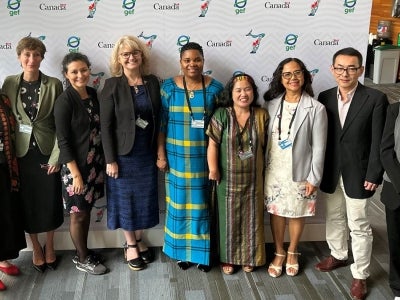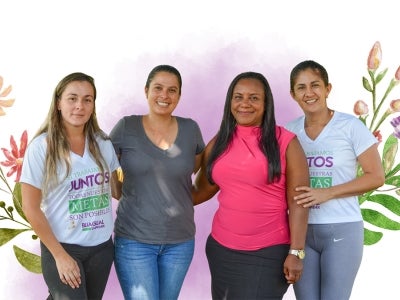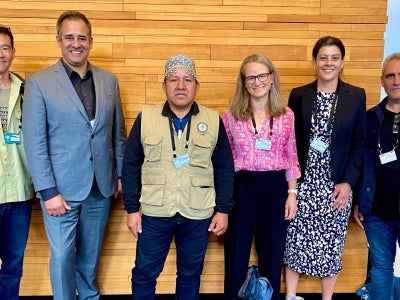
Women gathering under a tree near a village in South Sudan.
When Mandelena became a mother, she was only 16 years old. During the prolonged dry season in Gwor County, South Sudan over the last two years, Mandelena and her family have been able to eat only one meal per day. In her community, crops are failing, cattle are dying and children are dropping out of school because of hunger. Women and girls walk four to five hours every day to collect water, and young girls are married off for a dowry of cattle as soon as they hit puberty.
Elsewhere in the country, under a giant tree in the remote town of Terekeka, a group of 25 women talk about how their lives are affected by changing weather patterns. They joke and laugh about their plight, as if a sense of levity can somehow alleviate their workloads and quiet their hungry stomachs. According to the women, one thing remains constant despite the changing weather: they get beaten by their husbands every day, regardless of the rainfall patterns.
“The struggles of women and girls are only part of the picture, as gender equality concerns both men and women,” said Victor Tsang, UN Environment’s Gender Officer, who led the organization’s gender analysis in South Sudan for a climate change adaptation project.
“Cattle raiding is common in South Sudan, and it is intimately linked with men’s needs to pay a good dowry for a young bride. The result is a culture of violence, including sexual violence. And the backdrop is climate change and environmental degradation, which intensifies hunger, reduces water availability and kills cattle.”
Guided by its own Gender Policy, UN Environment strives to conduct a context-based gender analysis of each of its projects.
“The power dynamics of women and men vary across contexts and over time,” says Tsang. “For instance, in Nepal, one’s caste and ethnicity matter as much as one’s sex. A woman from the Brahmin upper caste could be more privileged than a man from the Dalit, or lowest caste. Without sufficient understanding of such gender and social dynamics, a project risks excluding or even doing harm to people in disadvantaged positions.”
UN Environment is developing climate change adaptation projects in both Nepal and South Sudan for backing from the Global Environment Facility’s Least Developed Countries Fund. UN Environment is fully committed to supporting the Global Environment Facility’s recently revised Gender Policy, Tsang says, as well as the implementation of its own policy.
Both the Nepal and South Sudan projects focus on strengthening institutional and community capacity in ecosystem-based adaptation – building resilience to the effects of climate change, such as irregular rainfall patterns, through the conservation, restoration and sustainable management of natural ecosystems.
For instance, in Nepal, the project seeks to improve water conservation, groundwater recharge and soil stability in the Kathmandu Valley. In South Sudan, the project aims to restore degraded land, promote conservation agriculture and diversify livelihoods in local communities. Currently under development, the projects are expected to be submitted to the Global Environment Facility in the second half of 2018.
Back in Gwor County, with Mandelena's permission, Tsang holds tight to the young woman's infant boy, Emmanuel. “I looked at him and could not help thinking of my own young son,” says Tsang. “It is this human touch that makes all the data and reports UN Environment produces real.”
“UN Environment can play a critical role in helping the peoples and nations of the world take on the daunting tasks of adapting to climate change, restoring degraded ecosystems and advancing gender equality,” says Tsang. “For every child like Emmanuel to have the chance to grow up healthily, however, we still have a long way to go.”
8 March is International Women's Day. Learn more about UN Environment's work on gender.
This story was originally published by UN Environment.


